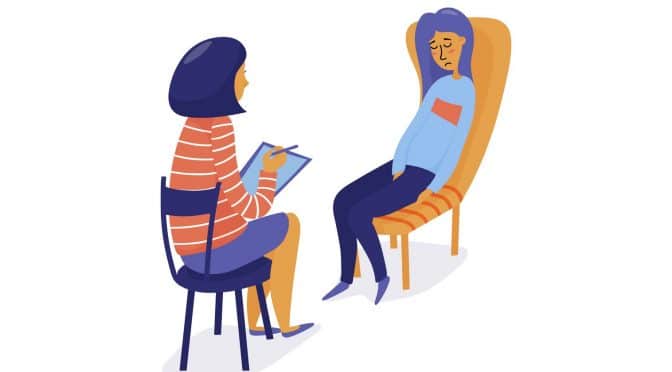Why the Best Psychologist in Delhi Can Change Your Mental Health
Why the Best Psychologist in Delhi Can Change Your Mental Health
Blog Article
The Duty of Psych Treatment in Taking Care Of Anxiousness and Depression
Psychotherapy has become a foundation in the management of anxiousness and clinical depression, using customized interventions that range from Cognitive-Behavioral Treatment (CBT) to mindfulness-based techniques. These methods not just help individuals in recognizing and reorganizing unfavorable idea patterns but likewise foster present-moment recognition, lowering the propensity to ponder. As we check out the numerous dimensions of psychotherapy, it comes to be obvious that these methods do more than merely reduce signs; they dramatically enhance psychological guideline and interpersonal abilities - Best Psychologist in Delhi. What continues to be to be checked out is how these therapeutic strategies can be effectively tailored to satisfy individual requirements, thus optimizing their influence.
Understanding Stress And Anxiety and Depression
Understanding stress and anxiety and anxiety requires a thorough take a look at these common mental health and wellness problems, which typically coexist and significantly effect a person's day-to-day life. Anxiousness is identified by relentless, excessive worry and are afraid concerning everyday situations. Signs consist of restlessness, rapid heart rate, and problem focusing. Alternatively, clinical depression manifests as a prevalent feeling of emptiness, hopelessness, or sadness, typically gone along with by a loss of rate of interest in previously delighted in tasks, modifications in hunger, and sleep disruptions.
The conjunction of anxiousness and depression can make complex and exacerbate symptoms medical diagnosis and therapy. People struggling with both conditions may experience a lot more extreme symptoms, better disability in job-related and social functioning, and a longer duration of illness. This comorbidity requires a nuanced understanding and strategy to treatment.
Cognitive patterns like negative thinking and maladaptive behaviors can perpetuate these problems. Comprehensive analysis by psychological health specialists is crucial to discern the visibility and degree of these problems, paving the way for customized therapeutic techniques.
Kinds of Psychotherapy
Psychotherapy, also called talk therapy, includes a variety of treatment methods developed to ease symptoms of stress and anxiety and anxiety by attending to the underlying psychological and mental problems. Various kinds of psychotherapy are tailored to satisfy the special requirements of individuals, offering a variety of strategies to psychological wellness care.
One widely used kind is psychodynamic treatment, which concentrates on understanding and solving subconscious disputes stemming from early life experiences. By exploring these deep-rooted problems, clients gain understanding right into their current actions and mood.
Interpersonal Therapy (IPT) is another effective technique that focuses on improving social relationships and social working to minimize depressive signs. It generally addresses problems such as sorrow, function shifts, and interpersonal disagreements.
Humanistic therapies, such as Client-Centered Therapy, stress personal development and self-actualization. Best Psychologist in Delhi. These strategies create an encouraging atmosphere where individuals can discover their feelings and develop a more powerful feeling of self
Finally, Dialectical Habits Treatment (DBT) integrates cognitive-behavioral techniques with mindfulness methods. Initially created for borderline character problem, DBT has been adapted to deal with stress and anxiety and anxiety by teaching abilities in distress resistance, emotional guideline, i loved this and interpersonal efficiency.
These varied psychotherapeutic techniques provide several paths to mental wellness and wellness, satisfying specific preferences and restorative requirements.
Cognitive-Behavioral Treatment (CBT)
Among the various psychotherapeutic methods, Cognitive-Behavioral Therapy (CBT) stands out for its organized, goal-oriented approach in dealing with anxiety and anxiety. Developed by Aaron T. Beck in the 1960s, CBT is predicated on the principle that maladaptive thinking patterns add considerably to emotional distress and behavior issues. By recognizing and restructuring these unfavorable thought patterns, CBT intends to alleviate signs and foster healthier cognitive procedures.
The therapy includes a variety of strategies, consisting of cognitive restructuring, exposure therapy, and behavioral activation. Cognitive restructuring focuses on testing and customizing distorted cognitions, while exposure treatment progressively acclimates individuals to anxiety-provoking stimulations, reducing avoidance behaviors.
Empirical proof underscores the effectiveness of CBT, with numerous researches showing its efficiency in lowering signs of anxiousness and depression. This therapeutic method has been adapted for different populations and settings, proving versatile and versatile. Its organized nature, empirical assistance, and concentrate on ability purchase make CBT a foundation in the psychotherapeutic therapy of anxiousness and anxiety.
Mindfulness-Based Techniques
Mindfulness-Based Techniques have actually gathered significant interest in recent times as efficient treatments for anxiety and clinical depression. Rooted in ancient reflection methods, these strategies aim to cultivate an increased awareness of the present minute, which can aid people disengage from the ruminative thought patterns frequently associated with stress and anxiety and depressive disorders.

Likewise, Mindfulness-Based Cognitive Treatment (MBCT) incorporates principles from Cognitive-Behavioral Therapy (CBT) with mindfulness approaches. MBCT is particularly effective in avoiding relapse in people with frequent clinical depression. By recognizing early indication of depressive episodes, people trained in MBCT can apply mindfulness methods to minimize the onset of full-on episodes.
Advantages of Psychotherapy
Countless studies have shown the extensive benefits of psychotherapy for people grappling with stress and anxiety and anxiety. Psychiatric therapy furnishes clients with coping techniques to manage upsetting feelings, thus lowering signs additional resources and symptoms of anxiousness and clinical depression.
In addition, psychotherapy offers a structured environment for self-exploration and insight. By reviewing their experiences and feelings with a skilled therapist, people can discover underlying concerns adding to their psychological wellness struggles. This self-awareness is a vital step towards long-lasting recovery and strength.
One more substantial advantage is the enhancement of social skills. Anxiousness and check here depression commonly stress connections, bring about seclusion. Via healing treatments, individuals find out effective interaction and conflict-resolution skills, which can improve their communications and foster supportive partnerships.
Furthermore, psychotherapy supplies a customized strategy to treatment. Therapists can adapt strategies to fulfill the unique requirements of each person, guaranteeing a customized treatment plan. This customization enhances the efficacy of therapy, advertising sustained psychological health renovations. Inevitably, the advantages of psychotherapy prolong beyond symptom relief, contributing to overall wellness and quality of life.

Final Thought
Psychotherapy considerably contributes to the monitoring of anxiety and anxiety by providing efficient coping strategies and a protected environment for self-exploration. Methods such as Cognitive-Behavioral Treatment (CBT) and mindfulness-based approaches contribute in determining and restructuring negative idea patterns, while promoting present-moment recognition. These tailored treatments not only alleviate signs and symptoms yet likewise enhance psychological law and social skills, thus improving overall health and lifestyle for people encountering these mental health obstacles.
Psychiatric therapy has arised as a foundation in the management of stress and anxiety and depression, using customized interventions that range from Cognitive-Behavioral Therapy (CBT) to mindfulness-based approaches.Recognizing stress and anxiety and anxiety needs a comprehensive look at these prevalent psychological wellness conditions, which commonly exist side-by-side and dramatically impact a person's everyday life.Among the numerous psychotherapeutic modalities, Cognitive-Behavioral Therapy (CBT) stands out for its structured, goal-oriented method in treating stress and anxiety and depression.Countless research studies have actually shown the profound advantages of psychotherapy for individuals grappling with anxiousness and clinical depression. Psychiatric therapy gears up clients with dealing strategies to handle distressing feelings, consequently lowering symptoms of anxiety and anxiety.
Report this page